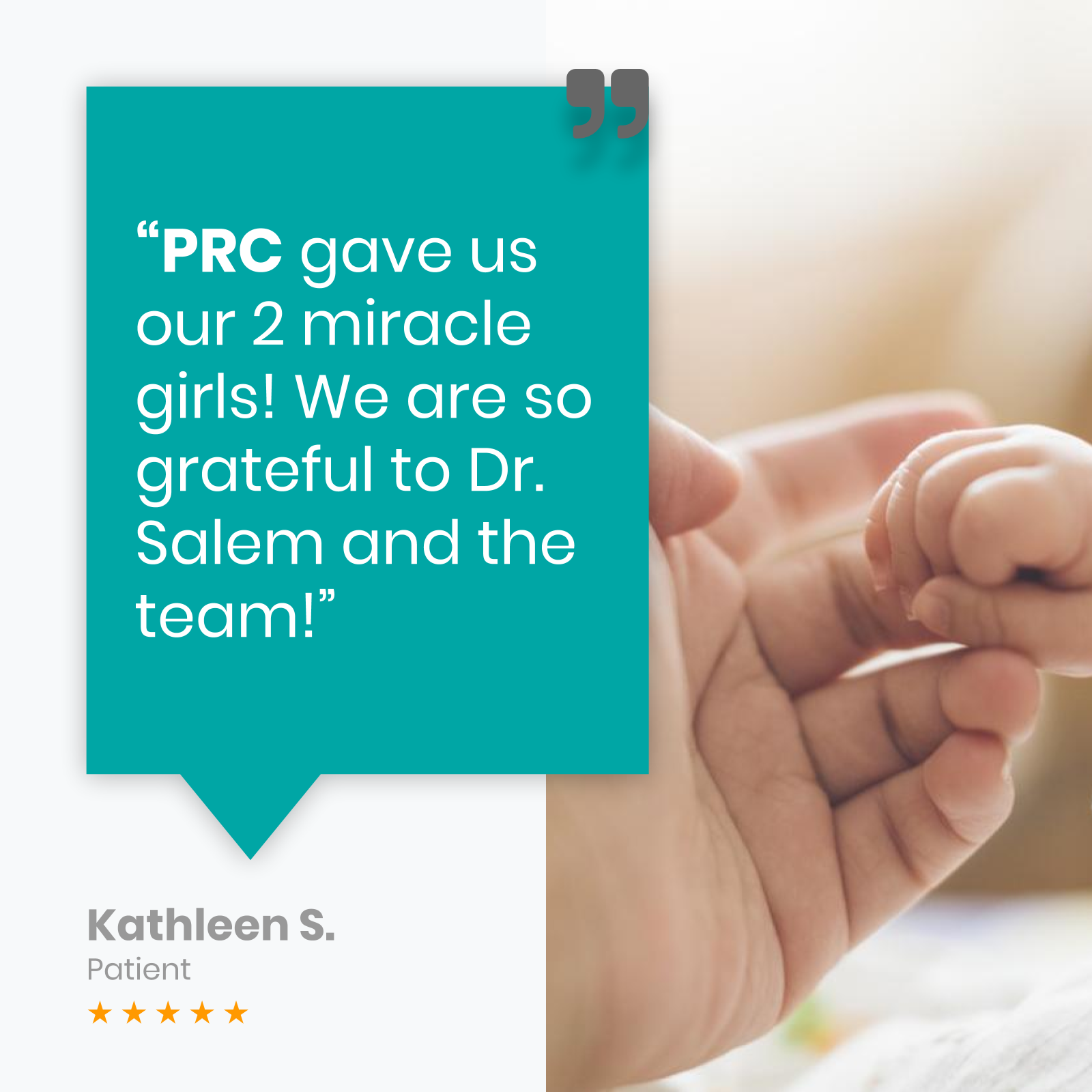Struggling to conceive is an emotional and challenging experience, but there is hope. At Pacific Reproductive Center, we’re here to guide you with the utmost care and compassion.
Our fertility experts are ready to help you prepare for IVF and navigate each step with confidence and hope.
What Is IVF Preparation?
If you are interested in beginning the IVF journey, it’s important to understand what’s involved Here is a quick overview of IVF tips and what you can expect:
- Initial consultation with your healthcare provider to understand the IVF process, potential risks, and expectations.
- Review your and your partner’s medical and fertility history to understand any relevant conditions or treatments.
- Screening tests to identify issues impacting you or your partner’s fertility.
- Blood tests and ultrasound to evaluate the number and quality of remaining eggs.
- Semen analysis to assess sperm quality, quantity, and motility (movement).
- Infectious disease screening tests to identify illnesses potentially impacting fertility.
- Genetic screening tests to identify conditions potentially impacting fertility.
- Uterine evaluation to assess the health and structure of the uterus.
- Lifestyle adjustments to improve your overall physical and mental health. These may include:
- Eating a well-balanced diet.
- Getting 7-8 hours of restorative sleep each night.
- Exercising regularly to maintain a healthy weight.
- Quitting tobacco products and recreational drugs.
- Limiting alcohol consumption.
- Practicing relaxation techniques (e.g., yoga or meditation).
- Taking a prenatal vitamin.
- Prescription medications to support the uterine lining and improve the chances of implantation.
Preparing for IVF
Here are ten things you can do when preparing for IVF.
Find a Reputable Fertility Center
Research the clinic’s experience, success rates, and staff qualifications to find a reputable fertility center. We also recommend considering their communication style and ethical practices to ensure they align with your values and expectations.
Understand the IVF Process
Here is a brief overview of the IVF process:
- Ovarian Stimulation
This process uses personalized hormone therapy to encourage the ovaries to produce multiple eggs. This is closely monitored through blood tests and transvaginal ultrasounds. - Egg Retrieval
Once the eggs are mature, a minor surgical procedure is performed to collect them from the ovaries. - Sperm Collection
A sperm sample is collected from the male partner or sperm donor on the same day as the retrieval.
- Fertilization
The eggs are then fertilized with the sperm in the lab and checked 18 hours later to confirm whether fertilization is successful. (In some cases, intracytoplasmic sperm injection (ICSI) may be used, where a single sperm is injected directly into an egg.) - Embryo Culture
If successful, the fertilized eggs (embryos) continue to grow and divide in the lab for 3-5 days. - Embryo Transfer
A healthy embryo is then selected and transferred into the woman’s uterus using a catheter and syringe. - Pregnancy Test
About 10-14 days after the embryo transfer, a blood test is performed to check for pregnancy.
Adopt a Healthy Lifestyle
If you are considering fertility treatments, one of the best ways to prepare for IVF one of the most important things you can do to increase your chances of a healthy pregnancy is to adopt a healthy lifestyle. This includes making conscious choices and establishing habits that prioritize your physical, mental, and emotional health and well-being.
Consider Fertility Supplements
It is important to follow all doctors’ instructions during fertility treatments. This may include taking IVF medications as well as specific vitamins or minerals. Talk to your fertility specialist to determine which (if any) fertility supplements are right for you.
Prepare Yourself Emotionally
The IVF process can be emotionally taxing and preparing yourself mentally and emotionally is essential.
Consider seeking support from loved ones, joining a support group, or engaging in stress-reducing activities such as yoga or meditation.
Understand the Financial Aspect
IVF can be costly, and it is essential to be financially prepared.
Contact your insurance provider to determine if IVF is covered under your plan. If not, explore alternative payment options such as financing or payment plans offered by the fertility clinic.
How to Prepare for IVF Physically
Optimizing Your Diet for Fertility
A healthy diet can help support your body and improve your chances of a successful transfer.
Focus on eating whole foods, including fruits, leafy green vegetables, whole grains, lean protein, and healthy fats, while limiting processed foods, added sugars, and unhealthy fats.
Recommended Supplements and Vitamins
Women undergoing fertility treatments can consider adding the following vitamins and supplements to their diet.
- Folic acid
Folic acid supplementation can positively impact female fertility, improving embryo quality and increasing the chances of successful IVF/ICSI outcomes. - CoQ10
Coenzyme Q10 (CoQ10) is an antioxidant that supports energy production and cell protection. Some studies suggest it may also improve IVF outcomes in certain women. - L-carnitine
L-carnitine is a naturally occurring amino acid that supports energy production and cellular metabolism. It may also help improve IVF outcomes in certain women. - Zinc
Zinc is an essential nutrient that may support improved implantation rates.
*Always consult your fertility specialist before starting any new supplement to ensure it is safe for you and your fertility needs. They can also determine the appropriate dosage.
Importance of Regular Exercise and Maintaining a Healthy Weight
Maintaining a healthy weight through regular, moderate exercise can positively impact IVF outcomes by improving overall health and hormone balance and potentially increasing the chances of successful implantation.
Pairing low-impact activities like walking, yoga, and light strength training with a balanced diet can help support optimal fertility.
Managing Pre-Existing Medical Conditions
Carefully managing pre-existing medical conditions (e.g., diabetes, hypothyroidism) prior to IVF can make the process more successful and minimize the risks for both the mother and baby.
How to Prepare for IVF Mentally & Emotionally
Coping With IVF-Related Stress and Anxiety
The IVF journey can be hopeful and challenging. It’s important to approach it with strength and self-compassion, set realistic expectations, and understand that feeling a mix of emotions is okay. Try these stress-relieving activities:
- Deep breathing.
- Connecting with loved ones.
- Taking time for self-care.
- Engaging in your favorite hobby or activity.
The Role of Counseling and Support Groups
Participate in individual counseling and support groups to express your feelings, share your fears, and connect with others on a similar path in a safe space.
Preparing for Emotional Highs and Lows
Emotional ups and downs are a part of the IVF journey. A trusted support system can help you navigate your journey with more peace.
Medical Preparations for IVF
Initial Fertility Assessments and Diagnostic Tests
Before you start IVF, your fertility specialist will run a few tests to get a clear picture of your reproductive health. These help them tailor a treatment plan just for you and catch any potential issues early on.
Understanding the IVF Treatment Timeline
The IVF treatment timeline involves several steps and can take between four to six weeks, depending on your treatment plan and unique needs.
Medications and Hormone Therapy Preparation
Medications and hormone therapy are used to stimulate your ovaries and prepare your body for pregnancy. Your fertility specialist will guide you each step of the way and ensure you understand what to expect and how to manage your treatment schedule.
Monitoring Appointments and Their Importance
Attending all monitoring appointments (e.g., blood tests and ultrasounds) is critical because they help track your response to treatment. These appointments allow your fertility specialist to adjust medications as needed to ensure the best possible IVF outcome.
How to Prep for IVF Transfer
Steps to Take Before Your Embryo Transfer
Before your embryo transfer, your fertility specialist will provide specific instructions, which may include the following:
- Adjusting medications.
- Maintaining a healthy diet.
- Avoiding certain activities.
Remember to relax and manage anxiety symptoms as you reach this important milestone to increase your chances of implantation and pregnancy.
Medications and Hormonal Support
Common medications and hormonal support for IVF include:
- Clomiphene Citrate (Clomid) and Follicle-Stimulating Hormone (FSH)
These medications help stimulate the ovaries to produce multiple eggs in a single cycle. - Luteinizing Hormone (LH)
This mimics the natural hormonal environment needed for egg development. - Lupron and Ganirelix
These GnRH Agonists/Antagonists help prevent premature ovulation. - Human Chorionic Gonadotropin (hCG)
This medication triggers the final maturation of eggs, preparing them for fertilization. - Estrogen
This medication helps thicken the uterine lining, preparing it for embryo implantation. - Progesterone
This medication supports endometrial development and early pregnancy.
Activity and Rest Guidelines for a Successful Transfer
After your embryo transfer your body needs time to rest and focus on implantation.
While complete bed rest isn’t necessary, taking it easy and following your doctor’s advice can help encourage implantation.
How Long Does It Take to Prepare for IVF?
Factors That Influence IVF Preparation Time
Several factors can influence the time it takes to prepare for IVF, including:
Individual Health Factors
- Age.
- Weight.
- Diet.
- Physical activity.
- Smoking and alcohol consumption.
- Pre-existing medical conditions.
- Stress levels.
Planned Treatment Protocols
- Natural cycle IVF or frozen embryo transfer (FET) have different timelines.
- Additional required procedures (e.g., egg freezing or embryo biopsies) can add to the overall preparation timeline.
Other Factors
- Sperm quality.
- Embryo quality.
- Stress and anxiety levels.
Typical IVF Preparation Timeline
There are several stages in a typical IVF preparation timeline, which can take between four and six weeks.
- Initial consultation and planning (1-2 weeks).
- Ovarian stimulation (8-14 days).
- Egg retrieval procedure and fertilization (1 day).
- Embryo development (3-5 days).
- Embryo transfer procedure (1 day).
- Pregnancy test (10-14 days after embryo transfer procedure).
A pregnancy test is often given two weeks after the embryo transfer procedure, making the overall timeline between six and eight weeks, from initial consultation and fertility assessment to pregnancy test.
Why Choose PRC for IVF Preparation?
Pacific Reproductive Center is a family-owned, patient-first practice dedicated to helping women through their fertility journey. Our board-certified doctors have extensive experience in obstetrics, gynecology, infertility, and microsurgery and our success rates consistently exceed national industry standards.
We are committed to delivering you the best possible experience, reproductive technologies, and opportunities for success. Learn more about us today.
Schedule a Consultation With Our IVF Experts
Contact our fertility specialists today to discuss available treatment options and to find out if IVF is right for you.
This should be an H2, then there should be an H3 about maintaining a healthy weight before the next paragraph
Are there herbs in the list below? If not, change to “supplements”
Treatments
Pacific Reproductive Center has been successfully aiding conception for over two decades. We optimize the conditions of fertility treatment to give every potential parent the greatest chance of successful childbirth.
Resources
We ensure that every patient fully understands their medical condition and treatment options available to them. We understand each patient is unique so we help guide you through the best option to support your own fertility journey.
Looking for the Best Fertility Clinic in Southern California?
Pacific Reproductive Center has four convenient locations throughout Southern California, making it easy for patients to receive quality care close to home. Each IVF fertility center has an on-site lab, next-generation services, and state-of-the-art equipment.
Whether in Glendale, Torrance, Irvine, or Corona, our world-class fertility doctors can help you build the family you’ve always wanted.
3720 Lomita Blvd, Suite 200 Torrance, CA 90505
116 E. Broadway, Suite 300 Glendale, CA 91205
10 Post Irvine, CA 92618
381 Corporate Terrace Corona, CA 92879




